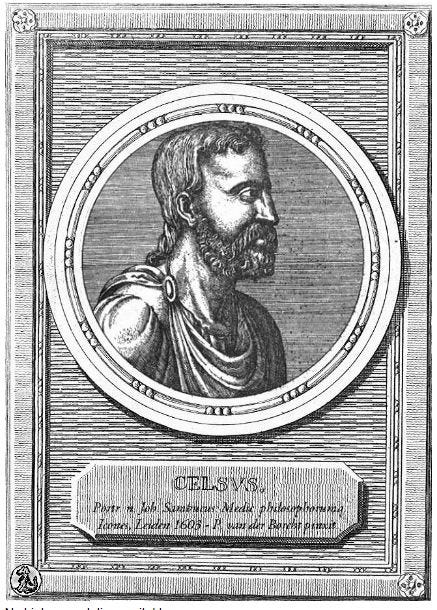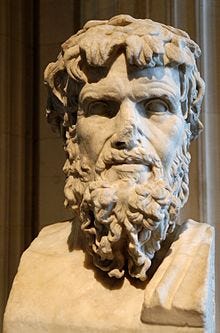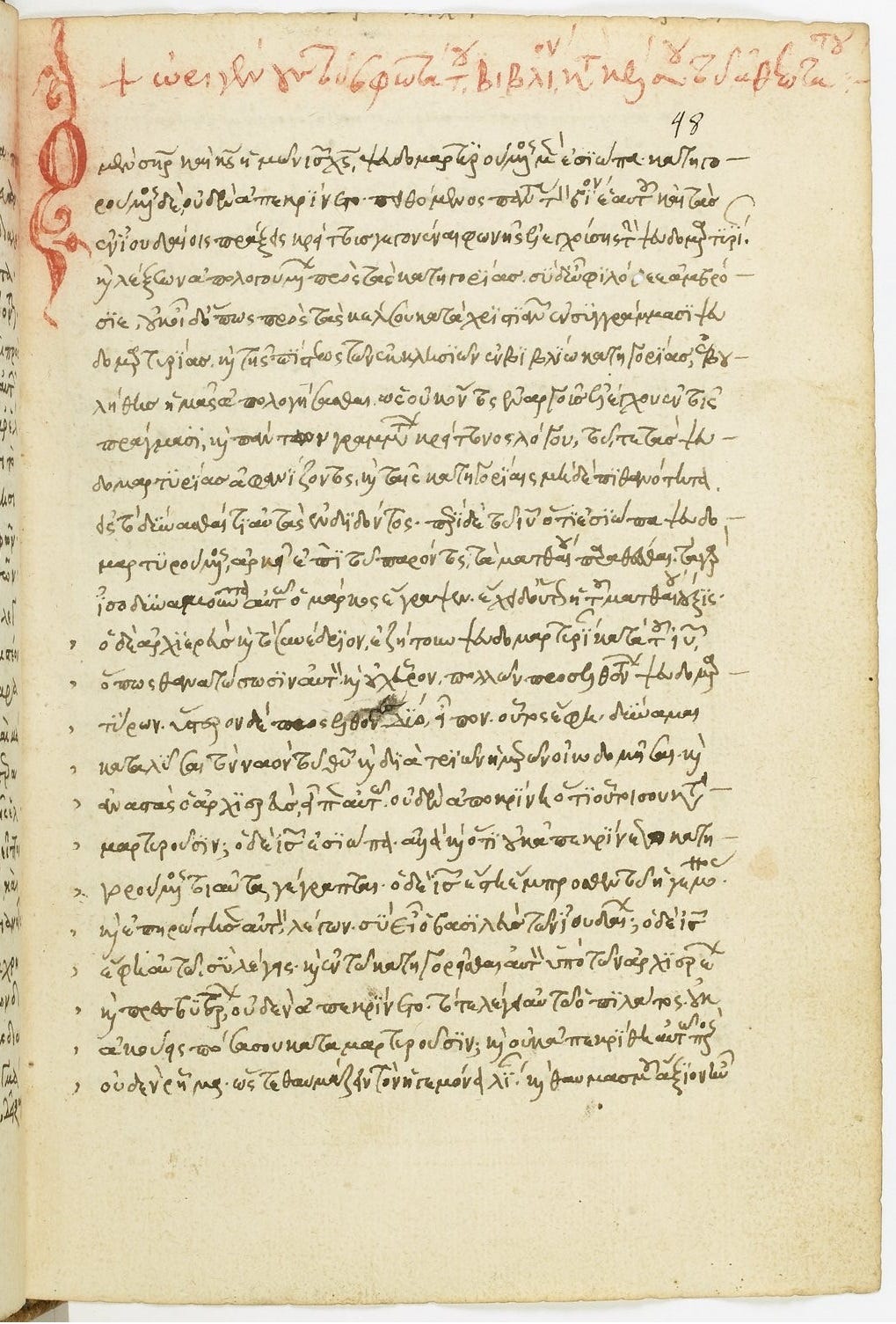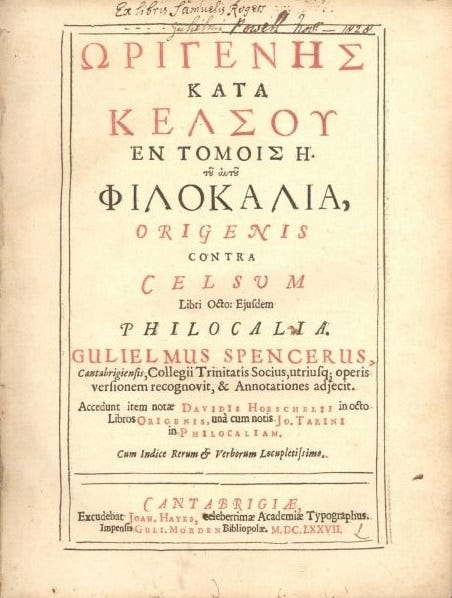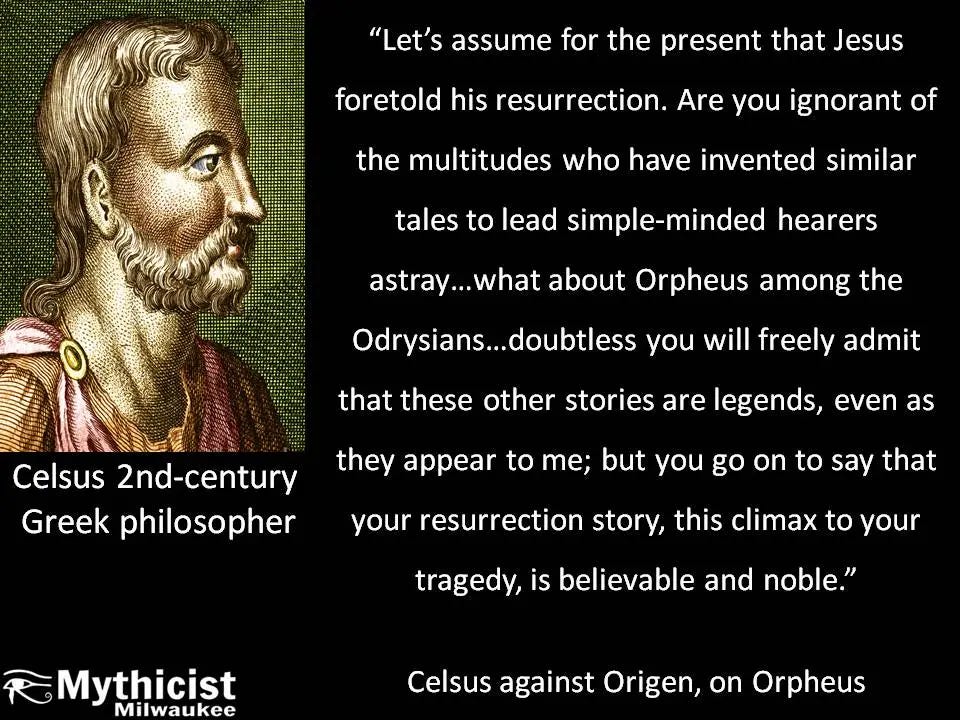The First Critic to Write a Book Against Christianity: CELSUS
Celsus was a second century Greek pagan philosopher and opponent of Christianity. He wrote "The True Word", the first extant written attack against Christians.
WHO WAS CELSUS?
Celsus was the first critic of the early church to write a book against Christianity (at least that we still possess). Let’s get to know this critic of the ancient church, the pagan intellectual Celsus.
Celsus, a second century Greek philosopher, wrote a polemical tour de force titled True Doctrine (also translated as True Word, True Account or True Discourse), published circa 170 AD. Celsus’ attack was the first all-out (and somewhat informed) written salvo we have on Christianity. More than a passing comment or a veiled allusion; it was a collection of objections contra Christianity.
Initially, Celsus may have been overlooked by the Christians of his time. However, a century later, Origen (c. 185 - c. 254 AD) thought it prudent to respond to Celsus in his Against Celsus (ca. 246 AD). An ironic feature of Origen going toe to toe with the ghost of Celsus: both were heavily influenced by Platonism! They held some key presuppositions in common. Of course, Origen saw God as personal; Celsus did not. Celsus believed Christianity’s “doctrine of a divine intervention in history is incompatible with Platonic axioms”.1 Celsus, was a philosopher of the Middle Platonist school and did not reject everything in Christianity outright (e.g., the Logos doctrine and certain ethical principles).
WHY DID CELSUS ATTACK CHRISTIANITY?
Celsus attacked the early church out of genuine love for the Roman Empire, which he felt was being undermined by Christianity. Celsus was annoyed, perhaps frightened that Christianity was not linked to any one state or place. He chided Christians as “sectarians”. Early church historian Henry Chadwick says2
“Celsus was the first known person to realize this non-political, quietist, and pacifist community had in its power to transform the social and political order of the empire” and that “it aimed at the capture of society throughout all its strata”.
This is something Celsus did not want. As a Roman gentlemen, Celsus was a social conservative. Christianity was potentially socially disruptive.
The work of Celsus dispalys misgivings about polytheism. Yet, he still defended traditional Roman religious views. Two examples:
Celsus claimed that at hero shrines, the gods can be seen in human form and they do not appear only once “in a secretive and stealthy manner like the fellow who deceived the Christians” [Origen, Against Celsus 7.35].
Celsus lists positive benefits some have experienced from oracles: wisdom, revelation, miracle signs, appearances, health, and fulfilled prophetic utterances [Origen, Against Celsus 8.45].
Celsus displayed a general Roman attitude regarding religion: old was better than new. This approach was one reason the Romans gave Jews a degree of freedom in their religious practice – Judaism was old:
“As the Jews, then, became a peculiar people, and enacted laws in keeping with the customs of their country, and maintain them up to the present time, and observe a mode of worship which, whatever be its nature, is yet derived from their fathers…” [Against Celsus 5.25].
Christianity was novel, though, and therefore suspect. Celsus chided Christians for rejecting traditional gods on one hand and then worshipping a mere man on the other. Worse yet; the man had lived recently: “If these men worshipped no other God but one, perhaps they would have a valid argument against the others. But in fact they worship to an extravagant degree this man who appeared recently” (Contra Celsum 8.12). Celsus even mocked this new faith for not having buildings.
Celsus discerned Christianity was not like Judaism: it was not relatively constrained to a certain ethnic group; people of all backgrounds were converting to Christianity. Celsus explained this Christian unity in light of sociology: “Their agreement is quite amazing, the more so as it may be shown to rest on no trustworthy foundation.” Celsus believed the thing that held Christians together was persecution; he saw it as helping their deplorable cause. “However they have a trustworthy foundation for their unity in social dissidence and the advantage which it brings and in the fear of outsiders- these are factors which strengthen their faith”.3
HOW DID CELSUS KNOW ABOUT CHRISTIANITY?
Generally speaking, Celsus did not uncritically repeat wild rumors floating around about Christianity. Celsus launched attacks where it would hurt. He was not prone to attack a straw men. Historian Stephen Benko writes that Celsus “was a man who relied not on rumors and hearsay evidence but on personal observation and careful study”.4 Celsus made an effort to study Christianity to dissect it properly. He studied the Hebrew Scriptures. He studied some of the gospels. He knew of Matthew, Luke, and 1 Corinthians.
Most likely, Celsus had personal contact with Christians. He claimed he knew what appear to be “hyper-Charismatics” (Montanists, perhaps?) in both Palestine and Phoenicia. In fact, Celsus quotes some of their ecstatic utterances in his True Doctrine, as quoted in Against Celsus 7.9.
It is possible some passioante Christians even shared the gospel with Celsus. This, the evangelistic zeal of the early church, irritated Celsus: “Christians with little or no education seized every opportunity to witness to people, and when confronted by educated pagans they still would not stop pushing their opinions”.5
Celsus familiar with Christian evangelists. He was also familiar with the work of Christian apologists, the heretic Marcion, and the gnostic sects. Celsus was acquainted enough with Marcionism to use a clever tactic: leveraging the Christian’s own heretics against the orthodox Christians.
WHAT DID CELSUS SAY AGAINST CHRISTIANITY?
Celsus says the praxis of Jesus stands in contradistinction to the praxis of Christians. Contra Celsum 2.6: “Jesus kept all the Jewish customs”. Of course, Celsus had his fair share of criticism for the Jews and their Scriptures as well. Celsus mocked the Hebrew Scriptures for being chock full of stupid myths and silly fables. This is important in light of the popular but debunked “Christ-Myth Theory” because Celsus never made similar charges about the historical existence of Jesus.
Celsus probably borrowed some of his verbal ammunition from Jewish sources, possibly an unknown Jewish anti-Christian polemical tract. In the course of an attack on Christian doctrine, Celsus introduces a Jewish character (Origen called him “the Jew of Celsus”) who repeats common Jewish jabs against Jesus [Against Celsus 1.32]. By this method, Celsus even includes the Talmudic charge that Jesus was the illegitimate son of a soldier named Panthera.
Contra Celsum 1.38: “there he learned certain magical powers which the Egyptians are proud to have. He returned full of pride in these powers, and gave himself the title of God”. An alternate translation of this section reads as follows: “…having tried his hand at certain magical powers he returned from there, and on account of those magical powers gave himself the title of God”.
Celsus also says Jesus studied magic and practiced sorcery in Egypt. Both of these accusations can be found in the Babylonian Talmud (b. Sanhedrin 67a; 106a; cf. The Toledoth Jesu).6 Celsus uses more elements from the life of Jesus against the Christians here. Celsus refers to both the miracles and some of the (misconstrued) background of Jesus in a very real, albeit negative, way.
Contra Celsum 6.34: “If Christ had been thrown down a cliff or pushed into a pit, or strangled with a rope … then they would speak of a cliff of life, or a pit of resurrection, or a rope of immortality”.
Celsus mockingly confirms the death of Jesus as well as the method. Celsus made fun of Christian references to the cross as a glorious thing. Celsus questioned the logic of the crucifixion, wondering why the so-called “Son of God” would let himself be killed that way. Celsus pointed out that Christians would not worship Zeus because his tomb was right there in plain sight in Crete, yet their “god” was supposedly resurrected from his tomb.
Celsus did not believe in the resurrection. In the mind of Celsus, the resurrection was a decidedly disgusting and repugnant belief. Celsus wondered why Christians worshipped a dead man as immortal. Further, Celsus argues that Christian doctrine twisted the Greek concept of immortality of the soul into the resurrection. Celsus felt the doctrine of the resurrection was based on an incorrect interpretation of reincarnation. Celsus chided the Christians for rejecting the traditional gods on one hand and then worshipping a mere man on the other. Worse yet; the man had lived recently: “If these men worshipped no other God but one, perhaps they would have a valid argument against the others. But in fact they worship to an extravagant degree this man who appeared recently” (Contra Celsum 8.12).
Not surprisingly, Celsus honed in on the central feature of Christianity: the worship of Christ. He criticized Christians for being inconsistent: how can they claim to worship the one true God, reject polytheism, and yet then offer unto Jesus hyperthreskeuousi: “excessive worship”?[Against Celsus 8.12] Besides, there were other men more worthy of worship than Christ, such as figures from ancient Greece. If that is not bad enough, this man was a convicted criminal who had been disgraced and executed. It is not hard to see why Celsus thought these were better candidates when he viewed Jesus, the lowly carpenter who was, “a pestilent fellow”, a liar and a wicked sorcerer (remember, Celsus claimed Jesus learned magic while studying in Egypt).
Against Celsus 4.3: “What could be the purpose of such a visit to earth by God? To find out what is taking place among human? Does he not know everything?”
Celsus fundamentally rejected the incarnation. He accused Christians of exalting Jesus the man to godhood status in order to ignore any real god – a Christological cop out. For Celsus, it was ludicrous they thought this was consistent with monotheism!
CELSUS AND THE CHRIST-MYTH THEORY
Celsus was willing to use historical elements from the life of Jesus against Christianity; a clever tactic. However, modern Christ-Mythicists should see one thing he never did: questioned the existence of Jesus. If Celsus had any inkling that Jesus never existed, he would have been more than willing to say so. He could have just said, “Your Messiah never even existed”?
Although he had great suspicions about the alleged supernatural aspects to his life, such as the virgin birth and the fulfilled prophecies attributed to him, Celsus never questioned the existence of Jesus.
FINAL WORD
I respect the work of Celsus. I admit some of his arguments went unanswered by Christian apologists, even the illuminative Origen. In a twist of history that would surprise both men, the reason we have Celsus’ True Doctrine preserved today is because Origen quoted Celsus at-length in his response work, Contra Celsum.
____________________________________________________________________________
NOTES
Henry Chadwick, The Early Church (New York: Penguin Books, 1967), 116.
Henry Chadwick, The Early Church (New York: Penguin Books, 1967), 69.
Henry Chadwick, The Early Church (New York: Penguin Books, 1967), 54.
Stephen Benko, Pagan Rome and the Early Christians (Bloomington, IN: Indiana University Press, 1986), 148.
Tim Dowley, Eerdman’s Handbook to the History of Christianity, (Grand Rapids, MI: Eerdman’s, 1977), 87.
See Peter Schafer, Jesus in the Talmud (New Jersey: Princeton University Press, 2007).



